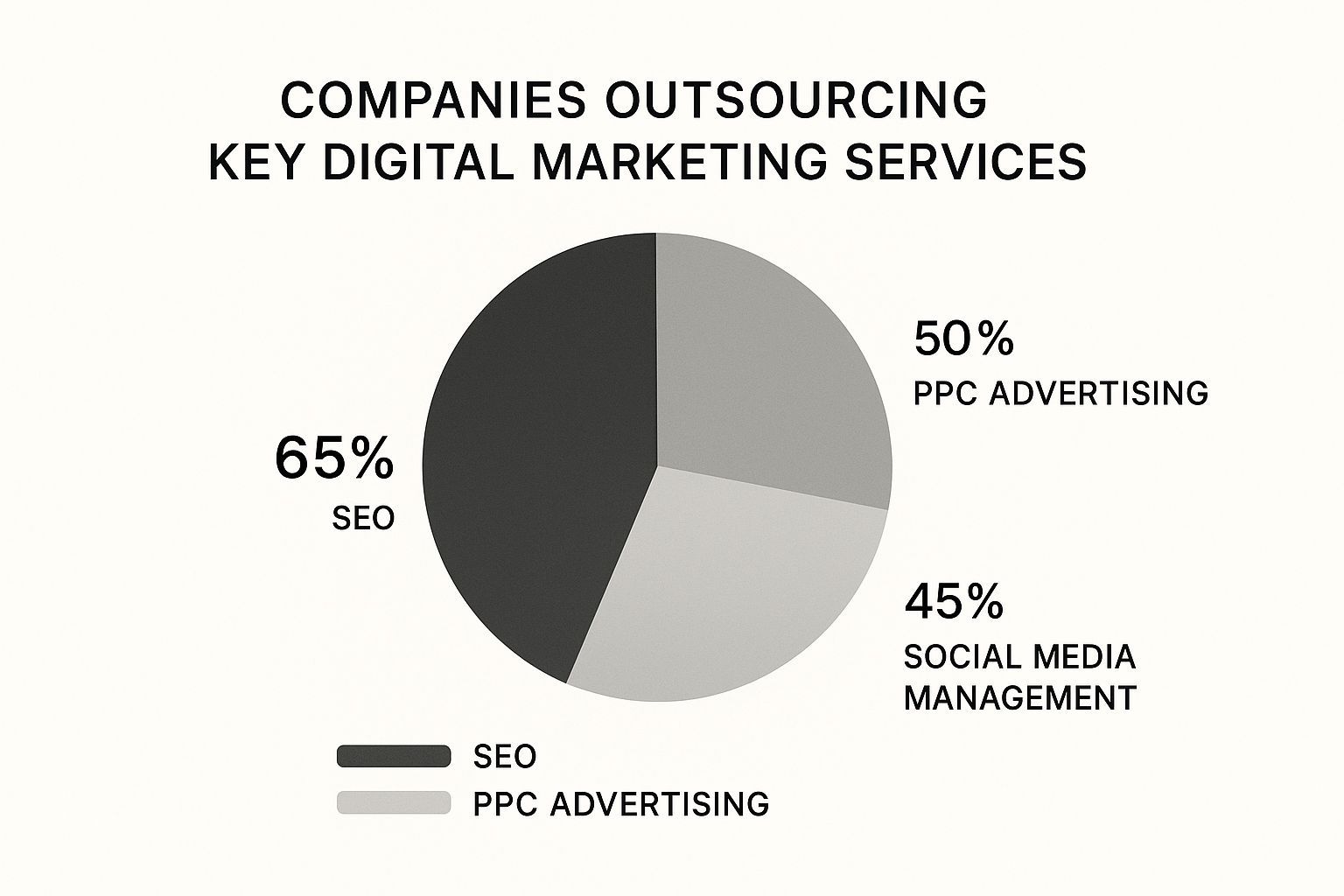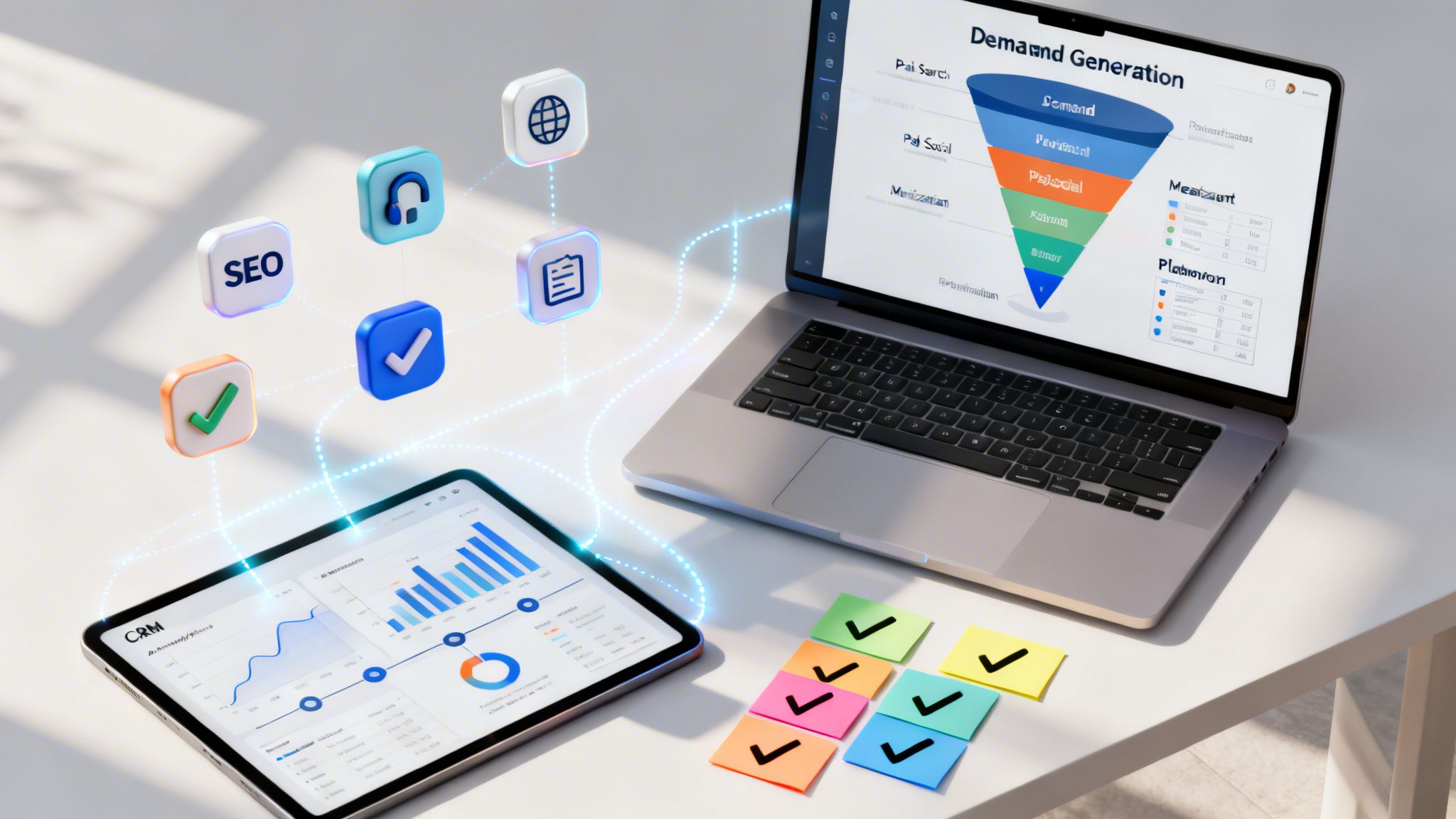Outsourcing digital marketing is the strategic practice of hiring an external agency or specialist to manage your company's online marketing efforts. It's become a go-to growth strategy for businesses aiming for top-tier expertise and rapid scalability, without the significant overhead of building a large in-house team. This approach allows you to focus on your core business operations while seasoned professionals handle the complexities of SEO, content creation, and paid advertising.
Why Smart Businesses Outsource Digital Marketing

Not long ago, most businesses kept marketing functions tightly under their own roof. However, the digital landscape has changed the game. The sheer velocity of technological evolution and the increasing demand for hyper-specialized skills have rendered that traditional model less effective.
Attempting to build a world-class digital marketing team internally is a monumental task. You can no longer just hire a few "marketing generalists." Today, success requires a full roster of specialists in fields that are constantly in flux.
This is where outsourcing transitions from a simple cost-cutting tactic to a powerful strategic move.
Consider a mid-sized tech company preparing to launch a new product. Their internal team excels at engineering but lacks deep expertise in SEO, pay-per-click (PPC) advertising, or social media campaign management. Hiring individual specialists for each role would be a slow and expensive process, accumulating tens of thousands in salaries, benefits, and training costs.
Access a Deep Bench of Talent Instantly
By partnering with an external agency, that same company gains an entire team of seasoned professionals from day one. Instead of a single new hire, they get a strategist, an SEO analyst, a content writer, and a PPC manager—all for a predictable monthly fee. This allows them to compete at a much higher level, immediately.
The market data supports this trend. The global digital marketing outsourcing market is projected to soar from USD 25.4 billion in 2024 to approximately USD 74.76 billion by 2034, reflecting a compound annual growth rate (CAGR) of 11.4%. This explosive growth is driven by companies seeking specialized skills that are too difficult and costly to maintain in-house. You can explore the data in this in-depth industry report.
The Strategic Shift from Cost to Agility
Outsourcing frees up your internal team to focus on what they do best—improving your product and serving your customers. The conversation shifts from "How do we manage a complex marketing department?" to "How do we guide our expert partner to achieve our key business goals?"
The core benefits are compelling:
- Scalable Growth: Easily ramp marketing efforts up or down based on campaign needs or seasonal demand, without the complexities of hiring or layoffs.
- Expertise on Demand: Access specialists in AI-driven analytics or video marketing without committing to another full-time salary.
- Strategic Focus: Your leadership can concentrate on core business strategy, innovation, and customer service, leaving the day-to-day marketing execution to proven experts.
By outsourcing, you're not just delegating tasks. You're integrating a fully-formed, expert marketing department that is agile, scalable, and relentlessly focused on delivering measurable results from the start.
This strategic pivot is essential for maintaining a competitive edge. You can explore a more detailed breakdown of the advantages of hiring a digital marketing agency to see how it can directly impact your bottom line.
The Real Strategic Wins of Outsourcing

While the conversation around outsourcing digital marketing often begins with cost savings, the most significant advantages are strategic. It’s not just about avoiding salaries; partnering with an external team unlocks capabilities that can fundamentally reshape your company's growth trajectory.
Think of it this way: building an in-house team is like buying one piece of gym equipment at a time for your home. You might start with dumbbells, but you're a long way from having a fully equipped fitness center. Outsourcing, in contrast, is like getting an all-access pass to a state-of-the-art gym—you instantly have every machine, tool, and expert trainer at your disposal.
This "all-access pass" is particularly powerful when it comes to technology. Top-tier agencies invest heavily in enterprise-level software for analytics, SEO research, and campaign management—tools often prohibitively expensive for a single business. You immediately gain the benefit of sophisticated data and competitive insights without the six-figure price tag.
Gaining an Objective Outside Perspective
One of the most underrated benefits of outsourcing digital marketing is gaining a truly objective outside perspective. Internal teams, no matter how talented, can develop "brand blindness." They become so immersed in the company culture that they may struggle to view their own strategy through a customer's eyes.
An external partner lacks these inherent biases. They are compensated to be ruthlessly honest about what’s working and what isn’t, identifying weaknesses and opportunities that internal teams might overlook. This unfiltered feedback is precisely what’s needed to break through growth plateaus and discover fresh strategic directions.
This fresh viewpoint is often a key driver of improved performance. An agency’s success is directly tied to your results, creating a powerful incentive to challenge assumptions and push for better outcomes. They aren’t weighed down by internal politics or historical baggage; their sole focus is on delivering measurable growth.
Driving Tangible Business Outcomes
Ultimately, strategic benefits must translate into tangible results. When you partner with a specialized agency, you are investing in a system designed for efficiency, scalability, and performance. This leads to several key outcomes:
- Faster Campaign Launches: Agencies have established processes and dedicated teams, enabling them to move from strategy to execution much more quickly than an overburdened internal team juggling multiple priorities.
- Enhanced ROI: Access to expert talent and advanced tools naturally leads to more effective campaigns. This is why 78% of businesses report a significant boost in ROI within the first six months of outsourcing, a testament to the efficiency and expertise agencies provide.
- Effortless Scalability: As your market evolves, you can scale your marketing efforts up or down without the cumbersome process of hiring or downsizing. This agility is a massive competitive advantage, allowing you to seize opportunities as they arise.
An outsourced team acts as a strategic amplifier. They take your business goals and apply specialized expertise, advanced technology, and objective insights to achieve them faster and more efficiently than would otherwise be possible.
By leveraging these benefits, you can transform your marketing function from a cost center into a predictable engine for revenue. This strategic approach is core to building a robust and resilient business. For a deeper look at how this works in practice, check out our guide on data-driven marketing solutions that turn insights into action.
Choosing Your Path: In-House vs. Outsourced Teams
Deciding whether to build your marketing team in-house or to outsource is a critical strategic choice. This isn't a simple decision with a clear winner; it’s about finding the right fit for your specific goals, industry, and company culture. The optimal solution for a fast-moving startup will be vastly different from that of an established enterprise in a heavily regulated field.
Let's move beyond generic pros-and-cons lists and examine this decision through the lens of real-world scenarios.
When an In-House Team Is Non-Negotiable
For some businesses, marketing is so tightly woven into the company’s DNA that an external team is not a viable option. Consider a brand built entirely around a founder's unique personality and voice. An outsourced agency would struggle to authentically replicate that specific tone and personal connection customers have come to expect.
Similarly, companies in heavily regulated industries like finance or healthcare often require an in-house team. These marketers need an intimate, day-to-day understanding of complex compliance rules where a single misstep can lead to serious legal and financial consequences. That deep institutional knowledge is a critical asset that is difficult to transfer to an external partner. In these cases, the control and tight integration of an internal team are non-negotiable.
When Outsourcing Provides the Decisive Edge
Conversely, there are moments when outsourcing digital marketing provides the speed and specialized skills needed to capitalize on a market opportunity. Imagine a B2B tech company launching a new software product. They have a brilliant development team but no in-house marketing firepower.
Hiring, training, and fully onboarding an internal marketing team could take six to twelve months—an eternity in the tech world. By outsourcing, they can have a team of seasoned SEO, PPC, and content specialists operational within weeks, capturing crucial market share before competitors can react. The outsourced team brings immediate momentum and a level of expertise that would take years to build from scratch.
The services most frequently delegated to agencies are those requiring deep, specialized knowledge that is constantly evolving. This data illustrates what companies are most comfortable entrusting to experts.

This trend is logical. Businesses are prioritizing outsourcing complex, algorithm-driven functions like SEO and PPC, where simply staying current is a full-time job.
To help you weigh the options, here's a direct comparison of the two models.
Comparing In-House vs. Outsourced Digital Marketing Teams
While this table highlights the classic trade-offs, many businesses are discovering they don't have to choose one or the other.
The Rise of the Hybrid Model: A Best-of-Both-Worlds Approach
Increasingly, businesses are realizing they don't have to commit to one extreme. A powerful hybrid model is emerging as a highly effective and flexible solution.
Here’s how it works: a company maintains a lean internal marketing lead or a small core team. This person acts as the strategic "quarterback," owning the brand vision, understanding long-term goals, and serving as the primary point of contact.
The internal lead doesn't execute every campaign. Instead, they direct and manage a portfolio of specialized external agencies—one for SEO, another for paid social, and perhaps a third for content creation.
This model offers incredible benefits:
- Expertise on Demand: You gain access to best-in-class specialists for each marketing channel without the massive overhead of hiring them all full-time.
- Strategic Alignment: The internal quarterback ensures all external partners are working collaboratively toward the same business objectives, maintaining a consistent brand voice.
- Flexibility and Scalability: It’s easy to swap out an agency if their performance declines or add a new partner to test a new channel, providing an agility that is impossible with a fixed in-house structure.
The hybrid approach creates a flexible, expert-driven marketing machine that can adapt to changing market conditions on the fly. It perfectly balances deep brand knowledge with top-tier specialized talent, often delivering superior results for a fraction of the cost of a fully staffed internal department. Of course, understanding the financial side is crucial, and you can learn more from our digital marketing services cost-benefit breakdown.
Navigating Potential Outsourcing Pitfalls

While outsourcing offers significant advantages, any smart business decision involves weighing the pros and cons. It’s not about fearing what could go wrong; it’s about having a solid plan to ensure things go right.
Common concerns are legitimate. You might worry about losing control of your brand's unique voice, dealing with communication breakdowns that cause delays, or compromising sensitive business data. These are valid points, but with the right framework, they are entirely manageable.
The goal isn't to avoid risks—it's to transform them into well-managed components of a transparent and successful partnership.
Protecting Your Brand Voice and Identity
One of the biggest fears is that an external team won't truly understand your brand. You’ve invested years in building a specific tone, a distinct culture, and a unique way of communicating with your customers. Handing over the reins can feel like you're relinquishing a piece of your company's soul.
This is where the onboarding process becomes your most powerful tool. It’s not about simply sending over a logo and a color palette; you need to immerse your new agency in your world from day one.
Think of it as a comprehensive brand immersion, not just a handover.
- Detailed Brand Style Guide: This must go beyond logos and colors. Include your mission, vision, values, and a crystal-clear "voice and tone" section. Show them what to say and, just as importantly, what not to say.
- Target Audience Personas: Provide a complete picture of your ideal customers. What are their biggest pain points? What are their goals? How do they prefer to be addressed?
- Access to Key Team Members: Allow the agency to speak directly with your head of sales, customer service representatives, and even your CEO. This direct access provides invaluable context that no document can fully capture.
When you treat your agency as a true extension of your team, you empower them to become dedicated brand champions, not just another vendor.
An outsourced agency doesn't have to dilute your brand. With a thorough and collaborative onboarding process, they can become its most articulate and effective advocates, amplifying your voice with expert precision.
Overcoming Communication and Transparency Hurdles
Clear communication is the absolute bedrock of any successful outsourcing relationship. Without it, minor misunderstandings can quickly escalate into major strategic misalignments, especially when dealing with different time zones. Vague updates and a lack of transparency will erode trust faster than anything else.
The key is to establish a structured communication rhythm from the outset. You need a single source of truth for all project-related information. Don't just hope for the best; build a system.
A weekly check-in is non-negotiable, but it must have a clear, repeatable agenda to be effective. A simple template keeps everyone aligned:
Weekly Sync Agenda Template
- Review Last Week’s Performance: How did key metrics (leads, traffic, conversions) compare against our goals?
- Progress on Key Projects: Quick status updates on major initiatives (e.g., new ad campaign, SEO content push).
- Upcoming Priorities: What is the primary focus for the week ahead?
- Blockers and Challenges: Is there anything the agency needs your help with to maintain momentum?
- Questions and Open Discussion: Dedicated time for brainstorming, feedback, and new ideas.
This structured approach, combined with a shared project management tool like Asana or Trello, provides everyone with 24/7 visibility into project progress and performance data. It eliminates confusion and builds a rock-solid foundation of trust and accountability.
Ensuring Data Security and Confidentiality
When you start outsourcing digital marketing, you are entrusting a partner with sensitive information—customer data, internal analytics, and future strategic plans. Ensuring that data remains secure is an absolute must for a safe and productive partnership.
Before signing a contract, you must conduct due diligence on an agency’s security protocols. This isn’t just about trust; it's about verifying their commitment to protecting your most valuable assets.
Start by asking direct questions about their data handling procedures and ensure the final contract includes robust security clauses. A reputable agency will be transparent about its security measures and should be prepared to provide documentation or answer any questions about its policies for data protection, access control, and confidentiality.
How to Pick the Right Digital Marketing Partner
Choosing a digital marketing partner can feel overwhelming. Countless agencies promise exceptional results, so how do you cut through the noise and find a team that will actually deliver? The secret is to look past slick presentations and dig into what makes a partnership work: a genuine strategic fit built to drive real growth.
This isn’t about hiring another vendor to check boxes off a list. It’s about finding a true partner. That requires a thoughtful, structured approach to ensure you’re entrusting your vision to a team that not only understands it but has the expertise to bring it to life.
Beyond the Portfolio: Look for Real Results
The first stop for most is an agency's portfolio, but it's crucial to review their case studies with a critical eye. A wall of impressive client logos is nice, but it doesn't tell the whole story. You need to look for proof of tangible business impact—not just vanity metrics like clicks and impressions.
A strong case study should draw a direct line from the agency's work to the client's business goals. Did their SEO efforts lead to a measurable increase in qualified leads? Did that social media campaign actually drive sales, not just likes? Look for hard numbers and a clear narrative demonstrating they understood the client's challenges and engineered a smart solution.
The global outsourcing market is on track to hit USD 450 billion by the end of 2025, growing at a steady 5.1% CAGR since 2020. This boom is fueled by the need for specialized skills and rising in-house costs, making your choice of a qualified partner more critical than ever. You can find more outsourcing statistics on virtuallatinos.com.
Asking the Right Questions on Discovery Calls
Once you have a shortlist, the discovery call is your opportunity to look behind the curtain. Any decent agency will ask you smart questions, but a great one will have even better answers to yours. This is your chance to move beyond the sales pitch and test their strategic thinking.
Don't arrive with a generic list of questions. Come prepared with inquiries designed to reveal their process and problem-solving skills. Your mission is to understand how they think, not just what services they offer.
Here are a few questions that get to the heart of the matter:
- Strategic Thinking: "Tell me about a campaign that didn't go as planned. What went wrong, what did you learn, and how did you pivot?" This reveals their honesty, adaptability, and ability to learn from mistakes.
- Process and Communication: "What does your onboarding process look like? How will you get up to speed on our brand, our industry, and our customers?" This shows how seriously they take understanding your business.
- Performance Measurement: "How do you define success for a client like us? Can you walk me through an example of a client report?" This ensures they focus on the metrics that actually impact your bottom line.
A potential partner's answer to a question about failure is often more revealing than their success stories. It demonstrates humility, a growth mindset, and the resilience needed in the unpredictable world of digital marketing.
Don't Underestimate Chemistry and Cultural Fit
Expertise and a proven track record are essential, but the importance of good chemistry and cultural fit cannot be overstated. You will be working closely with this team, sharing challenges and celebrating successes. A partnership founded on mutual respect and shared values is far more likely to succeed in the long run.
An agency that genuinely understands your company's mission will be more motivated and better equipped to act as a true extension of your team. Their campaigns will feel authentic because they get what you're trying to achieve. While a flashy client list is tempting, a partner who is truly invested in your success is priceless. Finding a team that meshes with your culture is a non-negotiable step when you decide on outsourcing digital marketing.
Ultimately, selecting the right partner is a major investment in your company’s future. By taking a methodical approach, asking tough questions, and prioritizing a strong cultural fit, you can find a team that will do more than just run campaigns—they’ll become a key driver of your long-term growth. For more practical tips on this journey, check out our complete guide on how to choose a digital marketing agency.
Common Questions About Outsourcing Digital Marketing
As you get closer to making a decision, it's normal to have a few remaining questions. The idea of outsourcing digital marketing is exciting, but the practical details are what truly matter. Let's provide some straight, actionable answers to the most common questions we hear.
We'll cover everything from expected costs to the very first steps, ensuring you have the information you need to make a smart move.
How Much Does It Cost to Outsource Digital Marketing?
There is no single price tag for outsourcing; the cost depends on the scope of work, the agency's experience, and your objectives. Think of it less as a fixed cost and more as a spectrum of investment, where each level provides a different degree of service and strategic support.
For a smaller business or startup, hiring a freelancer for a specific service—like SEO or social media management—might range from $1,000 to $3,000 per month. This is a solid way to make targeted improvements without a massive commitment.
For a more holistic strategy, a full-service agency on retainer is often the best approach. These partnerships typically start around $5,000 per month for small to mid-sized businesses. For larger companies with complex, multi-channel marketing needs, that figure can easily exceed $20,000 per month.
The most important thing is to demand clarity. Never agree to a vague proposal. Insist on a detailed scope of work that specifies every deliverable, from the number of blog posts to the exact ad spend they will manage. This transparency is non-negotiable—it's how you ensure you know exactly what your investment is buying.
Getting a handle on the financials is key. For a deeper look at how services are priced, our guide on social media marketing costs breaks it down in a way that applies to many other marketing channels, too.
What Are the First Steps to Get Started?
Deciding to outsource can feel like a massive step, but it’s much more manageable when you break it down into a methodical process. This ensures you find the right partner and start the relationship on the right foot.
The first move is to look inward. You can't properly vet an agency until you know exactly what you need from them.
- Define Your Goals Clearly: Move beyond vague wishes like "we want more traffic." Get specific and measurable. For example: "Increase qualified B2B leads from organic search by 20% in six months" or "Reduce our customer acquisition cost on paid social by 15% in Q3."
- Set a Realistic Budget: Using your goals and the cost ranges discussed, determine what you can realistically invest each month. A clear budget immediately narrows your search to agencies that are a good financial fit.
- Research and Shortlist: Your goal is to identify three to five potential agencies. Look for partners with proven experience in your industry or who specialize in the services you need. Use their case studies and client testimonials as your initial filter.
- Prepare for Discovery Calls: Don't just show up and let them lead. Come prepared with a list of sharp, strategic questions that probe their expertise and assess cultural fit. This preparation allows you to guide the conversation and get the answers that matter.
How Do You Ensure an Agency Understands Your Brand?
One of the biggest fears business owners have is that an external team will never truly grasp the unique voice and essence of their brand. It's a valid concern, but one that can be completely addressed with a proactive and thorough onboarding process. Your new partner’s ability to become a true brand champion is directly tied to the effort you put into bringing them into your world.
A great partnership begins not with the first campaign, but with a deep-dive kickoff meeting where you share your story, not just spreadsheets.
To facilitate this, provide your new agency with a "brand bible" that includes:
- A Detailed Style Guide: This should cover more than just your logo and color palette. It should define your brand’s tone of voice, personality, and even specific words or phrases to avoid.
- Target Audience Personas: Give them a crystal-clear picture of your customers. What are their pain points? What motivates them? How do they prefer to be addressed?
- Access to Key People: Allow the agency to speak with people across your company. Interviews with your sales and customer support teams can provide a 360-degree view of your business that data alone cannot offer.
Consistent communication and a structured feedback loop are the final pieces of the puzzle. This ensures that as your business evolves, your agency evolves right alongside you, keeping your brand message perfectly in sync.
Is Outsourcing a Good Fit for Startups?
Absolutely. In fact, outsourcing digital marketing is often an ideal match for startups. The startup world is about being nimble and making every dollar count—two areas where outsourcing excels. Founders are already stretched thin, juggling product development, fundraising, and daily operations. Marketing cannot be an afterthought, but building an in-house team is a slow, expensive distraction from the core mission.
Outsourcing provides immediate access to senior-level marketing experts without the hefty salary and long-term commitment of hiring a full-time CMO or building a team from the ground up.
For a startup, outsourcing is a strategic shortcut. It frees up founders to focus on what they do best—building an amazing product and company—while marketing is handled by a seasoned team that can start delivering results from day one.
This approach allows a startup to compete at a higher level, using sophisticated marketing tactics that would otherwise be out of reach and hitting critical early-stage growth milestones much faster.
Ready to stop guessing and start growing? The team at Twelverays specializes in creating data-driven digital marketing strategies that deliver measurable results. We combine deep expertise with full transparency to become the growth partner your business deserves. Let's talk about building a strategy that aligns with your unique goals. Schedule a discovery call with Twelverays today!





